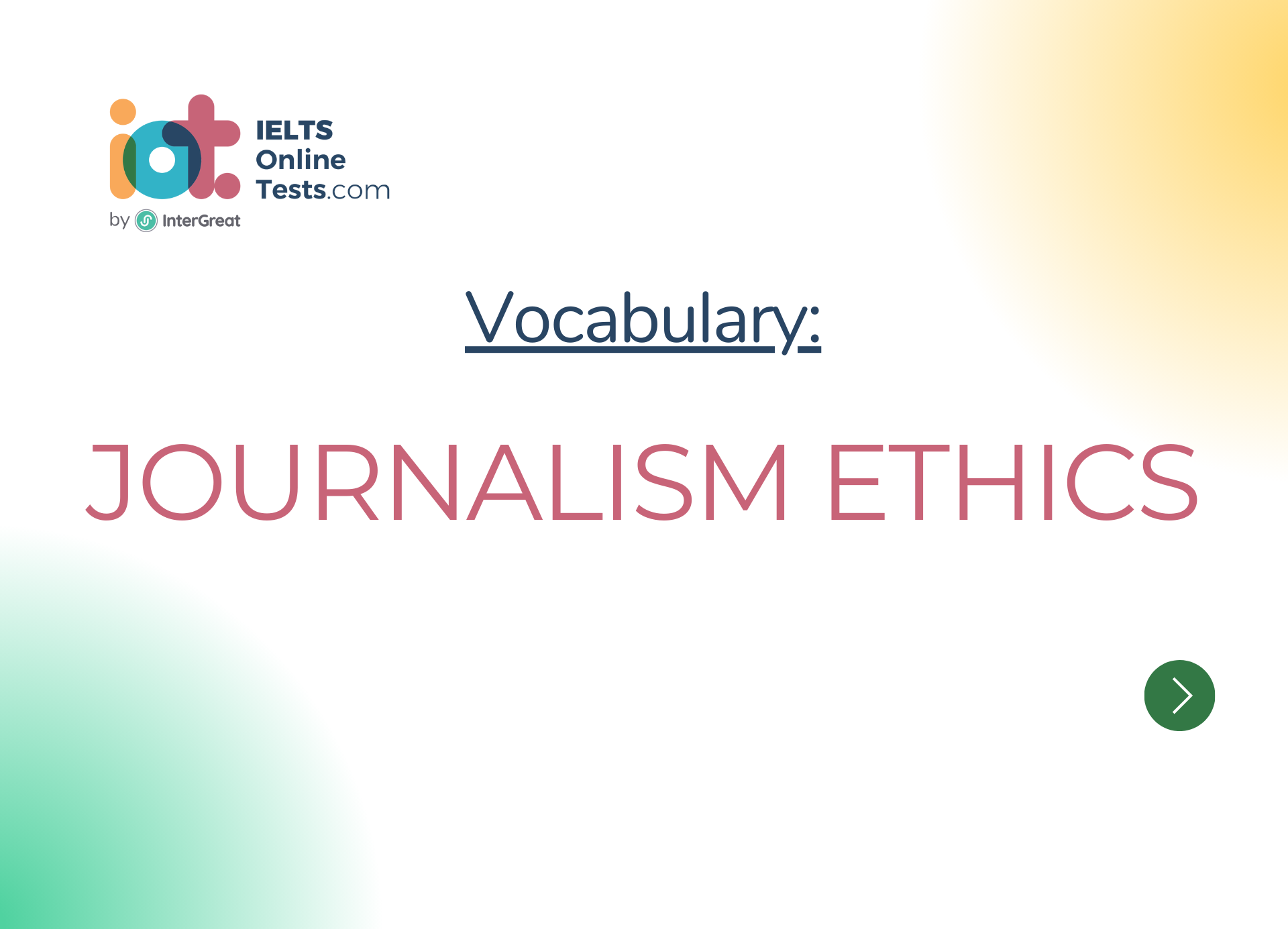
Journalism ethics
Here is a detailed explanation of vocabulary related to "Journalism ethics" suitable for IELTS band scores 6.5-8.0:
Integrity:
- Definition: Adhering to moral and ethical principles, maintaining honesty and credibility in reporting.
Objectivity:
- Definition: Presenting information in a neutral and unbiased manner without favoring any particular perspective.
Impartiality:
- Definition: Treating all subjects and sources fairly and without prejudice, avoiding personal opinions or biases.
Accuracy:
- Definition: Ensuring that information and facts presented in the news are correct, verified, and reliable.
Verification:
- Definition: The process of confirming the accuracy and authenticity of information from multiple sources.
Independence:
- Definition: Maintaining editorial autonomy and freedom from undue influence or control.
Conflict of Interest:
- Definition: A situation in which a journalist's personal interests may compromise their objectivity or fairness.
Sensationalism:
- Definition: Presenting news in an exaggerated or dramatic manner to attract attention and increase viewership.
Plagiarism:
- Definition: Using someone else's work, ideas, or content without proper attribution or permission.
Informed Consent:
- Definition: Obtaining permission from individuals before using their names, images, or personal details in news stories.
Privacy Protection:
- Definition: Respecting individuals' right to privacy and not intruding on their personal lives without legitimate public interest.
Public Interest:
- Definition: Focusing on news stories that are relevant and important to the general public.
Press Freedom:
- Definition: The right of journalists to report news without censorship or restraint from government authorities.
Confidential Sources:
- Definition: Individuals who provide information to journalists on the condition of anonymity.
Off the Record:
- Definition: Information shared by a source that is not to be published or attributed to them.
Retraction:
- Definition: Publicly acknowledging and correcting errors or inaccuracies in news reporting.
Ethical Dilemmas:
- Definition: Situations in which journalists face moral challenges in reporting sensitive or controversial issues.
Social Responsibility:
- Definition: Acknowledging the impact of media on society and adhering to ethical standards to avoid harm.
Accountability:
- Definition: Taking responsibility for one's actions and the accuracy of their reporting.
Media Watchdog:
- Definition: Independent organizations or individuals that monitor and critique media practices for ethical violations.
Code of Ethics:
- Definition: A set of guidelines or principles that journalists and media organizations follow to ensure ethical conduct.
Responsible Journalism:
- Definition: Producing accurate, balanced, and fair news content that serves the public interest.
Whistleblower Protection:
- Definition: Safeguards for individuals who expose wrongdoing or unethical practices within organizations.
Fair Use:
- Definition: The legal principle that allows limited use of copyrighted material without permission for purposes like news reporting.
Social Media Ethics:
- Definition: Applying ethical standards to the use of social media for news reporting and engagement with the audience.
Editorial Independence:
- Definition: Ensuring that journalists have the freedom to make editorial decisions without interference.
Media Accountability:
- Definition: Holding journalists and media organizations responsible for their actions and reporting.
Media Pluralism:
- Definition: Ensuring a diverse range of media sources and perspectives for a well-informed public.
Yellow Journalism:
- Definition: Sensational or biased news reporting that prioritizes sensationalism over accuracy.
Media Literacy:
- Definition: The ability of the audience to critically analyze and evaluate news content for accuracy and bias.
Embedding:
- Definition: The practice of journalists joining and reporting from military units in conflict zones.
Media Bias:
- Definition: Perceived favoritism towards certain political or social ideologies in news reporting.
Anonymous Sources:
- Definition: Individuals who provide information to journalists without revealing their identity.
Digital Ethics:
- Definition: Applying ethical principles to online journalism and digital media practices.
Accuracy Check:
- Definition: Verifying facts and information with primary sources to ensure accuracy in reporting.
Press Council:
- Definition: An independent organization that promotes ethical standards and handles complaints against the media.
In-Depth Reporting:
- Definition: Comprehensive and detailed coverage of news stories to provide a deeper understanding of the issues.
Media Regulation:
- Definition: Government or industry rules and standards that guide media practices and content.
Public Editor/Ombudsman:
- Definition: An independent representative within a media organization who addresses reader or viewer concerns.
Media Accountability:
- Definition: Holding journalists and media organizations responsible for their actions and reporting.
By incorporating these vocabulary words into your studies and practice, you can enhance your language proficiency and be better prepared for the IELTS exam. Best of luck!




